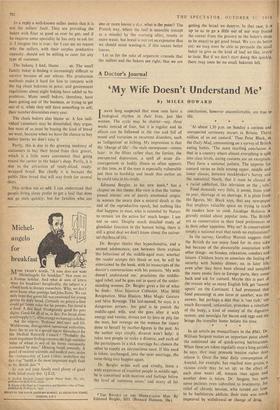A Doctor's Journal
`My Wife Doesn't Understand Me'
By MILES
[IOWAN!) y HAVE long suspected that most men have a 'biological rhythm in their lives, just like women. The cycle may be shorter—say, three' weeks instead of four, but it is regular and its effects can be followed in the rise and fall of mood and variation in recurrent disorders, such as 'indigestion' or itching. My impression is that the 'change of life'—the male menopause—comes later: in the fifties rather than .the forties; the unexpected depression, a. spell of acute dis- couragement or bodily illness so often appears at this time, as if the man is especially vulnerable just then to hardship and insult that earlier on he could take in his stride.
Edmund Bergler, in his new book,* has a chapter on this theme. His view is that the 'meno- pausal storms' are of purely emotional origin; in women the ovary dies a natural death at the end of the reproductive epoch, but nothing like that happens in man, who is intended by Nature to remain 'on the active list' much longer. I am not so sure. Despite much detailed study of glandular function in the human being, there is still a great deal we don't know about the univer- sal rhythms of life.
Dr. Bergler thinks that hypochondria, and a second adolescence, can between them explain the behaviour of the middle-aged man; whether the reader accepts this thesis or not, he will be entertained by the book, with its transcripts of the doctor's conversations with his patients. 'My wife doesn't understand me,' proclaims the middle- aged rebel, and he goes out in quest of the under- standing woman. Dr. Bergler gives a list of what he finds: Miss Injustice Collector, Miss Mild Resignation, Miss Illusion, Miss Magic Gesture and Miss Revenge. The last-named, he says, is a dangerous person : her goal is to punish the middle-aged wife, and she goes after it with energy and venom, driven not by love or pity for the man, but revenge on the woman for injury done to herself by mother-figures in the past. As the author says crisply, divorce won't help: it takes two people to make a divorce, and each of the participants in a sick marriage has chosen the other to supply an unconscious need. If this need is taken, unchanged, into the next marriage, the same thing may happen again.
Dr. Bergler writes well and vividly, from a wide experience of troubled people in middle-age; he is concerned with motives and feelings below the level of 'common sense,' and many of his * THE REVOLT OF THE MIDDLE-AGED MAN. By Edmund Bergler, MD. (Bernard Hanison, 30&) conclusions, however uncomfortable, are true 0 life.
* * * `At about 1.30 p.m. on Sunday a curious an
d
unexpected ceremony occurs in Britain. Thirt y million of us .eat custard.' Thus Peter Black, i n h the Daily Mail, commenting on a survey of Britis eating habits. 'The most startling conclusion Is
it that in a country where almost everything is spl into class levels, eating customs are an exceptio r They form a national pattern. The appetite f c
d
custard varies so little among upper, middle an d lower classes, between stockbroker's Surrey an the industrial North, that it must be classed a a racial addiction, like television or the I ools Food demands vary little, it seems, from year to year, shortage or no shortage. It is plain from the figures, Mr. Black says, that any newspaper that employs valuable space on trying to teach its readers how to cook Escalope Holstein is gravely misled about popular taste. The British are as conservative in their food preferences as in their other 'appetites. Why so? Is conservatism simply a national trait that needs no explanation ?
In the survey, Geoffrey Warren suggests that the British do not enjoy food for its own sake but because of the pleasurable association with other things : on Sunday, relaxation, comfort and leisure. Children learn to associate the feeling of security with Sunday dinner; so, in later life even after they have been abroad and sample' the more exotic fare in foreign parts, they co' back and ask for custard. Maybe this is part the reason why so many English folk get `tumor: upsets' on the Continent. I had presumed tha food poisoning, in one form or another, was till answer, but perhaps a diet that is `too rich,' to( much flavoured, unfamiliar, provokes a rebelliol of the body, a kind of mutiny of the digestivesystem; and nostalgia for bacon and eggs and WI brings the traveller home before his time.
* * *
In an article on tranquillisers in the BMJ, Dr William Sargant makes an important point abou the continued use of quick-acting barbiturates. When these are taken regularly over a long period, he says, they may promote tension rather than relieve it. Once the total daily consumption 0 Amytal, for example, has reached nine grains, vicious circle may be set up; as the effect of each dose wears off, tension rises again and another does is taken. Dr. Sargant has seen some patients even submitted to leucotomy, for relief of chronic tension, who turned out late] to be barbiturate addicts; their state was mud improved by withdrawal or change of drug.


































 Previous page
Previous page